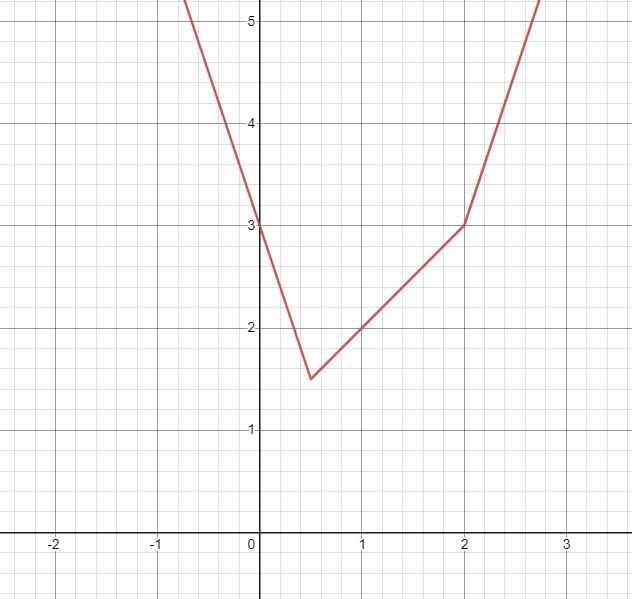4x^2+4x+1=x^2
Hãy nhập câu hỏi của bạn vào đây, nếu là tài khoản VIP, bạn sẽ được ưu tiên trả lời.


1. \(\sqrt{x^2-4x+3}=x-2\)
<=> x2 - 4x + 3 = (x - 2)2
<=> x2 - 4x + 3 = x2 - 4x + 4
<=> x2 - x2 - 4x + 4x = 1
<=> 0 = 1 (Vô lí)
vậy PT có nghiệm là S = \(\varnothing\)
2. \(\sqrt{4x^2-4x+1}=x-1\)
<=> \(\sqrt{\left(2x-1\right)^2}=x-1\)
<=> 2x - 1 = x - 1
<=> 2x - x = -1 + 1
<=> x = 0

1.
\(x^4-6x^2-12x-8=0\)
\(\Leftrightarrow x^4-2x^2+1-4x^2-12x-9=0\)
\(\Leftrightarrow\left(x^2-1\right)^2=\left(2x+3\right)^2\)
\(\Leftrightarrow\left[{}\begin{matrix}x^2-1=2x+3\\x^2-1=-2x-3\end{matrix}\right.\)
\(\Leftrightarrow\left[{}\begin{matrix}x^2-2x-4=0\\x^2+2x+2=0\end{matrix}\right.\)
\(\Leftrightarrow x=1\pm\sqrt{5}\)
3.
ĐK: \(x\ge-9\)
\(x^4-x^3-8x^2+9x-9+\left(x^2-x+1\right)\sqrt{x+9}=0\)
\(\Leftrightarrow\left(x^2-x+1\right)\left(\sqrt{x+9}+x^2-9\right)=0\)
\(\Leftrightarrow\sqrt{x+9}+x^2-9=0\left(1\right)\)
Đặt \(\sqrt{x+9}=t\left(t\ge0\right)\Rightarrow9=t^2-x\)
\(\left(1\right)\Leftrightarrow t+x^2+x-t^2=0\)
\(\Leftrightarrow\left(x+t\right)\left(x-t+1\right)=0\)
\(\Leftrightarrow\left[{}\begin{matrix}x=-t\\x=t-1\end{matrix}\right.\)
\(\Leftrightarrow\left[{}\begin{matrix}x=-\sqrt{x+9}\\x=\sqrt{x+9}-1\end{matrix}\right.\)
\(\Leftrightarrow...\)

\(p=\left(x+1\right)\left(x^2-x+1\right)+x-\left(x-1\right)\left(x^2+x+1\right)+2010\)\(=\left(x^3+1\right)+x-\left(x^3-1\right)+2010=x^3+1+x-x^3+1+2010=x+2012\)Với \(x=-2010\Rightarrow p=-2010+2012=2\)
\(q=16x\left(4x^2-5\right)-\left(4x+1\right)\left(16x^2-4x+1\right)=64x^3-80x-64x^3-1=-80x-1\)Với \(x=\dfrac{1}{5}\Rightarrow q=-80.\dfrac{1}{5}-1=-17\)

a,sửa đề : \(\left(\frac{1}{x^2+4x+4}-\frac{1}{x^2-4x+4}\right):\left(\frac{1}{x+2}+\frac{1}{x^2-4}\right)\)
\(=\left(\frac{1}{\left(x+2\right)^2}-\frac{1}{\left(x-2\right)^2}\right):\left(\frac{x-2+1}{\left(x+2\right)\left(x-2\right)}\right)\)
\(=\left(\frac{x^2-4x+4-x^2-4x-4}{\left(x+2\right)^2\left(x-2\right)^2}\right):\left(\frac{x-1}{\left(x+2\right)\left(x-2\right)}\right)\)
\(=\frac{-8x\left(x+2\right)\left(x-2\right)}{\left(x+2\right)^2\left(x-2\right)^2\left(x-1\right)}=\frac{-8x}{\left(x-1\right)\left(x^2-4\right)}\)
b, \(\left(\frac{2x}{2x-y}-\frac{4x^2}{4x^2+4xy+y^2}\right):\left(\frac{2x}{4x^2-y^2}+\frac{1}{y-2x}\right)\)
\(=\left(\frac{2x}{2x-y}-\frac{4x^2}{\left(2x+y\right)^2}\right):\left(\frac{2x}{\left(2x-y\right)\left(2x+y\right)}-\frac{1}{2x-y}\right)\)
\(=\left(\frac{2x\left(2x+y\right)^2-4x^2\left(2x-y\right)}{\left(2x-y\right)\left(2x+y\right)^2}\right):\left(\frac{2x-\left(2x+y\right)}{\left(2x-y\right)\left(2x+y\right)}\right)\)
\(=\left(\frac{8x^3+8x^2y+2xy^2-8x^3+4x^2y}{\left(2x-y\right)\left(2x+y\right)^2}\right):\left(\frac{-y}{\left(2x-y\right)\left(2x+y\right)}\right)\)
\(=-\left(\frac{12x^2y+xy^2}{2x+y}\right)=\frac{-12x^2y-xy^2}{2x+y}\)

a) \(\sqrt[]{x^2-2x+4}=2x-2\)
\(\Leftrightarrow\sqrt[]{x^2-2x+4}=2\left(x-1\right)\)
\(\Leftrightarrow\left\{{}\begin{matrix}2\left(x-1\right)\ge0\\x^2-2x+4=4\left(x-1\right)^2\end{matrix}\right.\)
\(\Leftrightarrow\left\{{}\begin{matrix}x-1\ge0\\x^2-2x+4=4x^2-8x+4\end{matrix}\right.\)
\(\Leftrightarrow\left\{{}\begin{matrix}x\ge1\\3x^2-6x=0\end{matrix}\right.\) \(\left(1\right)\)
Giải pt \(3x^2-6x=0\)
\(\Leftrightarrow3x\left(x-2\right)=0\)
\(\Leftrightarrow\left[{}\begin{matrix}x=0\\x-2=0\end{matrix}\right.\) \(\Leftrightarrow\left[{}\begin{matrix}x=0\left(loại\right)\\x=2\end{matrix}\right.\)
\(\left(1\right)\Leftrightarrow x=2\)
c) \(\sqrt{x^2-3x+2}=\sqrt[]{x-1}\)
\(\Leftrightarrow\left\{{}\begin{matrix}x-1\ge0\\x^2-3x+2=x-1\end{matrix}\right.\)
\(\Leftrightarrow\left\{{}\begin{matrix}x\ge1\\x^2-4x+3=0\end{matrix}\right.\)
\(\Leftrightarrow\left\{{}\begin{matrix}x\ge1\\x=1\cup x=3\end{matrix}\right.\)
\(\Leftrightarrow\left[{}\begin{matrix}x=1\\x=3\end{matrix}\right.\)

\(\left(2x+1\right)^2=x^2\Leftrightarrow\left[{}\begin{matrix}2x+1=x\\2x+1=-x\end{matrix}\right.\Leftrightarrow\left[{}\begin{matrix}x=-1\\x=-\dfrac{1}{3}\end{matrix}\right.\)
\(3x-4x^2+6-8x=x^2+4x+6\Leftrightarrow5x^2+9x=0\Leftrightarrow x=0;x=-\dfrac{9}{5}\)
đk : x khác 0 ; -1
\(\Rightarrow x^2+3x+x^2-x-2=2x\left(x+1\right)\Leftrightarrow2x-2=2x\left(voli\right)\)
Vậy pt vô nghiệm

Lời giải:
a. $\sqrt{x^2}=1$
$\Leftrightarrow |x|=1$
$\Leftrightarrow x=\pm 1$
b. $\sqrt{4x^2-4x+1}=3$
$\Leftrightarrow \sqrt{(2x-1)^2}=3$
$\Leftrightarrow |2x-1|=3$
$\Leftrightarrow 2x-1=\pm 3$
$\Leftrightarrow x=-1$ hoặc $x=2$
3. ĐKXĐ: $x^2\geq 4$
$\sqrt{x^2-4}+\sqrt{x^2+4x+4}=0$
Do $\sqrt{x^2-4}\geq 0; \sqrt{x^2+4x+4}\geq 0$ với mọi $x\in$ ĐKXĐ nên để tổng của chúng bằng $0$ thì:
$\sqrt{x^2-4}=\sqrt{x^2+4x+4}=0$
$\Leftrightarrow (x-2)(x+2)=(x+2)^2=0$
$\Leftrightarrow x=-2$
4.
PT \(\Leftrightarrow \left\{\begin{matrix} x-3\geq 0\\ x^2-4x+3=(x-3)^2\end{matrix}\right.\Leftrightarrow \left\{\begin{matrix} x\geq 3\\ x^2-4x+3=x^2-6x+9\end{matrix}\right.\)
\(\Leftrightarrow \left\{\begin{matrix} x\geq 3\\ 2x=6\end{matrix}\right.\Leftrightarrow x=3\)
Ý 1:
\(\sqrt{x^2}=1\\ \Leftrightarrow\left|x\right|=1\\ Vậy:x=1.hoặc.x=-1\\ S=\left\{\pm1\right\}\)
Ý 2:
\(\sqrt{4x^2-4x+1}=3\\ \Leftrightarrow\sqrt{\left(2x-1\right)^2}=3\\ \Leftrightarrow\left|2x-1\right|=3\\ \Leftrightarrow\left[{}\begin{matrix}2x-1=3\\2x-1=-3\end{matrix}\right.\\ \Leftrightarrow\left[{}\begin{matrix}x=2\\x=-1\end{matrix}\right.\\ Vậy:S=\left\{-1;2\right\}\)

\(y=\sqrt{\left(2x-1\right)^2}+\sqrt{\left(x-2\right)^2}=\left|2x-1\right|+\left|x-2\right|\)
\(y=\left[{}\begin{matrix}3x-3\left(\text{với }x\ge2\right)\\3-3x\left(\text{với }x\le\dfrac{1}{2}\right)\\x+1\left(\text{với }\dfrac{1}{2}\le x\le2\right)\end{matrix}\right.\)
Từ đó ta có đồ thị hàm số như sau:

Từ đồ thị ta thấy phương trình \(\sqrt{4x^2-4x+1}+\sqrt{x^2-4x+4}=m\):
- Có đúng 1 nghiệm khi \(m=\dfrac{3}{2}\)
- Có 2 nghiệm phân biệt khi \(m>\dfrac{3}{2}\)
- Vô nghiệm khi \(m< \dfrac{3}{2}\)

\(4x^2+4x+1=x^2\)
\(\Leftrightarrow3x^2+4x+1=0\)
\(\Leftrightarrow3x^2+3x+x+1=0\)
\(\Leftrightarrow3x\left(x+1\right)+\left(x+1\right)=0\)
\(\Leftrightarrow\left(x+1\right)\left(3x+1\right)=0\)
\(\Rightarrow\orbr{\begin{cases}x+1=0\\3x+1=0\end{cases}\Leftrightarrow}\orbr{\begin{cases}x=-1\\x=\frac{-1}{3}\end{cases}}\)
4x^2 + 4x + 1 = x^2
<=> 4x^2 + 4x + 1 - x^2 = 0
<=> 3x^2 + 4x + 1 = 0
<=> 3x^2 + 3x + x + 1 = 0
<=> 3x(x + 1) + (x + 1) = 0
<=> (x + 1)(3x + 1) = 0
<=> x + 1 = 0 hoặc 3x + 1 = 0
<=> x = -1 hoặc x = -1/3
Vậy: tập nghiệm của phương trình là: S = {-1; -1/3}